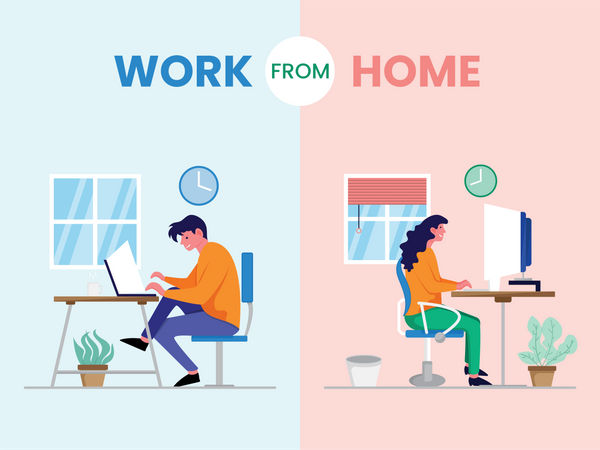If you are someone who works from home, chances are you are constantly struggling to balance your expectation of productivity versus the reality. Working from home affords you a number of comforts such as flexibility over your schedule, time saved due to lack of commute and not to mention comfy clothes! To every situation however, there is a flip-side. In this post we explore what we call
Work from Home Woes, and explore ways of tackling them.
Work From Home Woes #1: Procrastination
The very first obstacle that every professional who works from home encounters is procrastination. When you work from home, you begin the day with the illusion that you have the entire day to get a task done. This thought enables you to put off your work until the very last-minute and then you realize that the day is almost over! It is only then that you rush to finish the tasks, often working into late hours which has an adverse impact on your work life balance.
Procrastination is a vice that most of us face, whether we are working from a formal environment or from home. To tackle this, make your mind up to follow the “eat the frog” method, first thing in the morning. No, we are not suggesting you eat harmless froggies for breakfast, but what it means is, get the most difficult task out-of-the-way, the first thing in the morning. Once that is done, your productivity gets boosted automatically.
Work From Home Woes #2: Distractions
When in a formal work set up, distractions are comparatively fewer because work spaces are designed keeping this aspect in mind. You are less likely to spend time on the phone, or on Facebook when you know your supervisor may pop up unannounced. Besides, watching colleagues working spurs you into action, and you are less vulnerable to getting carried away by distractions. However, when you work from home you are prone to a zillion distractions, and even end up creating them for yourself. The television, noisy neighbors or family members, Netflix – the list would really never end if we started.
The solution here is to create a distraction free work zone, even if you are working from home. There are a few simple ways you can do that. Take care of the physical aspects such as letting your family know that you are working and to call upon you only when absolutely necessary. Remove the clutter from your work space, so it helps you retain your focus on work. Put your phone on silent, and disable notifications for your desktop. One effective way of dealing with distractions which may be internal or external is to divide up your day and tasks into 60 or 90 minute slots.
Simply focus on the one task for the allotted time, completely tuning out from everything else that may pose as a distraction. Another way of making this sustainable, and feeling good about yourself is setting simple rewards at the end of the day – if you feel satisfied with your productivity. A piece of cake, or an extra hour of Netflix – simple, yet effective. Like Tony Robbins once said, “feed your focus, starve your distractions”, and soon there will be no distractions.
Work from Home Woes #3: Isolation
It may get a bit lonely when you work from home. If you are an entrepreneur or a part of a team which functions from remote locations, the odds are you don’t get to have a lot of human interaction on a day-to-day basis. This can get to even the most introverted people. When you work from a formal set up, you meet colleagues and have a chance at engaging in conversation. Whereas, working from home minimally limits that option.
In which case, you have to make up for face time by consciously increasing your interaction with your team and peers through intensive communication and collaboration. Pick up the phone and talk to people more, take every opportunity to collaborate, create mailing groups to inform and be informed – just because you are not physically present in the office doesn’t mean you can’t be a present and active member of your team. If you are an entrepreneur, make it a point to be a part of groups of similar people who meet up once in a while and exchange ideas. A healthy dose of interaction is absolutely crucial to your productivity.
Work from Home Woes #4: Lack of Routine
Working from home comes along with that amazing feeling of being your own boss. There is however, a slight (not) problem attached. This knowledge of being your own boss can often induce a lack of discipline in your routine. Which means, you end up feeling unproductive – one of the worst feelings ever.
Even if you work from home, especially if you work from home, create a strict routine for yourself. Have a morning routine where you wake up at a fixed time every day. How you start your day has a definite impact on the progress of your day. Exercising and getting some fresh air, and a good breakfast is an imperative to having a fulfilling and productive day, or so we believe. Even if you do not have to go out to get to your workplace, make sure that you set strict working hours for yourself. Get to your desk by 9 AM, or a time you feel suits you, and go through your day in a time bound manner – just like you would if you were working in a formal environment.
Work from Home Woes #5: Getting bogged with Domestic Drudgery
Another peril of working from home is getting bogged down with domestic drudgery. There are ample things that we allow ourselves to procrastinate with – cleaning, organizing, doing our laundry, the list goes on. Being present at home while working does not help take your mind off from the dishes or the laundry or the cooking that needs to be done. This can retard your productivity to a greater extent than you can imagine. Domestic chores take up a lot of time. If we allow ourselves to get distracted by them, they won’t ever stop snatching our attention away from tasks that really need it.
So we’re saying…
Let go of things that do not need your immediate attention. Prioritize and see if a certain domestic task is a priority. While this may be an exception, do not make it a rule. It is worthwhile seeking help with the chores, so you are not constantly struggling to maintain balance. Speak with your family and divide up the chores. You could also hire a help if you are in a place to afford it. Delegating these tasks go a long way in fueling your productivity.
Being able to work from home can be the best thing that ever happened to you. Only, you need to be able to tackle the woes we just spoke about. And like you just read, it may not be all that difficult to put those woes away. All it takes is a strong mind, and a healthy body. With that combination, there will be no mountain you cannot scale – we mean it in a literal and metaphorical sense. Working from home can feel like a blessing – you get the gift of time because you end up saving so much time. Which means, you have a chance to get more done, and also a chance for more ‘me – time’. Win – win, then? We’d say yes!





